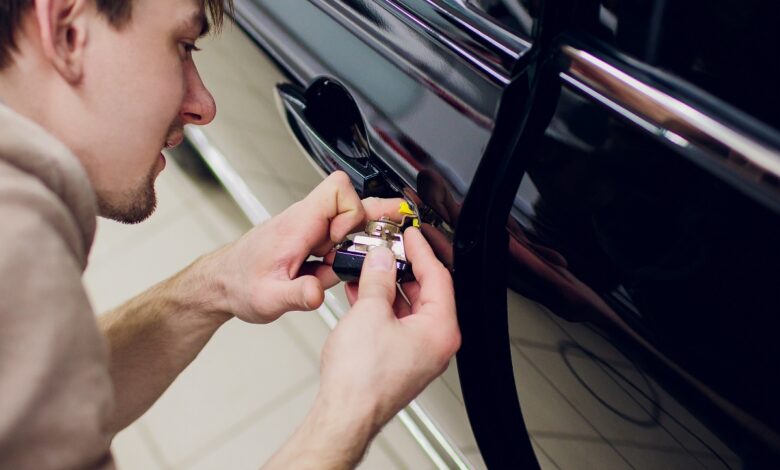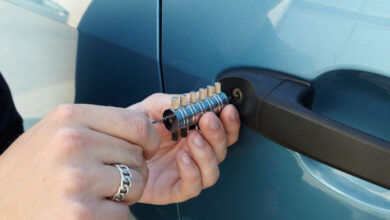Automotive Locksmith: Your Mobile Key to Car Troubles

Automotive locksmith specialize in providing lock and key services for all types of motor vehicles. Unlike general locksmiths who work with residential and commercial locks, automotive locksmiths focus on the complex lock systems found in cars, trucks, and other vehicles.
The profession has origins dating back to the early 20th century with the wide adoption of the automobile. As vehicle locking mechanisms became more advanced, a need emerged for specialists who understood how to bypass, repair, re-key, and replace them.
Today, automotive locksmiths offer a range of services related to vehicle lock security. This includes making replacement keys and fobs, unlocking cars when keys are lost or locked inside, fixing malfunctioning lock components, and upgrading locks and alarm systems. They utilize specialized tools and techniques to provide mobile, on-site assistance to stranded drivers and vehicle owners.
Common services include:
- Key cutting/replacement
- Lockout assistance
- Ignition repair
- Transponder key programming
- High-security key creation
- Lock repair/rebuilding
- Installation of anti-theft systems
With the complex electronic systems in modern vehicles, automotive locksmithing requires specialized technical knowledge and hands-on training. However, demand remains strong for these specialized services that keep vehicles secure and drivers on the road.
Common Services Provided
Automotive locksmiths provide a variety of services related to vehicle locks, keys, and security systems. Some of the most common services include:
Lockout Assistance
One of the most frequent requests is for lockout assistance when a driver is locked out of their vehicle. Locksmiths have the tools and expertise to gain entry into locked vehicles without causing any damage. This often involves manipulating lock mechanisms, bypassing locks, or creating new keys. Locksmiths can assist with lockouts of cars, trucks, vans, motorcycles, and other vehicles.
Key Cutting/Replacement
Automotive locksmiths can cut and program new keys when the original keys are lost, stolen, or damaged. They have key-cutting machines to replicate keys precisely based on the vehicle’s make and model. Locksmiths maintain extensive databases of key codes and can generate replacement keys quickly. They can also extract broken key fragments and repair damaged keys.
Ignition Repair
Faulty ignition switches and lock cylinders can prevent vehicles from starting. Locksmiths have the knowledge to diagnose ignition issues and perform repairs. Services may include extracting broken keys, replacing lock cylinders, fixing ignition switches and repairing ignition interlock devices.
Transponder Key Programming
Modern vehicle keys often contain transponder chips that must be electronically programmed. Locksmiths have the equipment and software to program new transponder keys. This involves accessing on-board vehicle computers to sync the key code so the vehicle recognizes the key. Locksmiths stay current on changing transponder technologies to program keys for all makes and models.
Equipment and Tools
Automotive locksmiths require specialized equipment and tools to perform their work. Some of the most common include:
Manual Pick Tools
-
Lock picks – These thin metal tools are inserted into the lock to manipulate the pins and open the lock. Common picks include hook picks, rake picks, half diamonds, and ball picks. Locksmiths use pick sets with a variety of picks for different locks.
-
Tension wrenches – Also called torque wrenches, these apply tension to the lock cylinder while picking to set the pins. Different sizes are needed for various keyways.
-
Jiggler keys – These are cut in a pattern to mimic different possible key cuts. They are inserted and jiggled in the lock to find the right opening.
-
Snap guns – These use sudden force to snap the lock and enable opening it. Mainly used for older wafer tumbler locks.
Electric Pick Tools
-
Electric pick guns – These use electric vibrations to bounce the pins, allowing the cylinder to turn. Great for fast entry.
-
Tubular lock picks – Designed for tubular cylinder locks. Uses a pick and tension tool.
Key Cutters
-
Code cutters – Cuts new keys based on the lock codes. Needs the make/model to decode the key.
-
Impressioning tools – Files blanks based on the lock’s pin impressions to create working keys.
-
Manual key cutters – Uses manual dexterity and skill to cut new keys. Versatile for many keys.
Code Readers and Key Programmers
-
Diagnostic readers – Connect to a vehicle’s OBD port to read codes and program transponder keys.
-
Key programmers – Programs blank transponder keys with the vehicle key code. Often combined with code readers.
Having the proper equipment for each automotive locksmithing job is essential for efficient service and successful outcomes. Investing in quality tools pays off through better reliability and versatility.
Training and Certification
Becoming a professional automotive locksmith requires specialized training and certification. Many locksmiths start by completing an apprenticeship under an experienced locksmith. This allows them to gain hands-on training in opening locks, making keys, installing and repairing various lock systems, and providing emergency services. Apprenticeships typically last 3-4 years.
Another option is enrolling in a locksmith school or training program. These programs teach the fundamentals of locksmithing through classroom instruction and hands-on labs. Subjects often include key identification, safe opening, lock picking, key cutting, lock installation, and automotive lock servicing. Programs range from a few weeks to over a year.
To demonstrate their competency, many locksmiths pursue professional certification through the Associated Locksmiths of America (ALOA). ALOA offers several certifications including Certified Automotive Locksmith (CAL), Certified Professional Locksmith (CPL), and Certified Master Locksmith (CML). These require passing exams and demonstrating work experience. Certification helps locksmiths showcase their expertise to customers.
Ongoing training is critical as well since automotive lock technology constantly evolves. Locksmiths must stay up-to-date on key fob programming, transponder keys, immobilizer systems, remote keyless systems, and other advances. Whether through formal education or independent study, locksmiths must commit to lifelong learning.
Mobile Services
An automotive locksmith ability to provide mobile services is one of the most important aspects of the profession. Being able to travel to customers’ locations to assist with lockouts, key replacements, and other issues is a huge benefit compared to customers having to arrange for towing to a shop.
Most automotive locksmiths operate out of fully equipped vans that contain all the necessary tools and parts to complete jobs on-site. These mobile workshops allow locksmiths to cut new keys, program transponders, make repairs, and rekey locks for residential, commercial, and automotive customers.
The mobility of a locksmith van provides immediate assistance when customers are locked out of homes, businesses, or vehicles. Rather than having to find alternate transportation or wait for a tow truck, a mobile locksmith can quickly travel to the customer’s location and gain entry. This on-site convenience is especially helpful in emergencies or bad weather when being locked out could be dangerous.
In summary, the ability to offer mobile services is a key advantage for automotive locksmiths. Well-stocked vans allow locksmiths to provide prompt on-site assistance for a variety of lockout situations and security needs. The importance of mobility continues to make automotive locksmiths an essential service.
Security and Anti-Theft Systems
Automotive security and anti-theft systems have advanced significantly in recent decades. Modern vehicles contain sophisticated technology designed to prevent unauthorized access and theft. Some of the most common security features found in today’s cars and trucks include:
Transponders
A transponder is an electronic chip embedded in the plastic head of the vehicle’s key. The chip sends a unique signal to the vehicle’s engine computer, allowing the computer to recognize the key and start the engine. Without the correct transponder signal, the vehicle will not start even if the physical key is able to turn in the ignition. Transponders provide an additional layer of security beyond traditional metal keys.
Immobilizers
An immobilizer is an electronic security device that prevents the engine from starting unless the correct key is present. It works together with the transponder key to disable the engine’s ignition or fuel delivery system. Like transponders, immobilizers aim to only allow authorized users to start the vehicle. Even if a thief bypasses the physical lock and turns the ignition, the engine will not start without the matching transponder key present.
Alarm Systems
Alarm systems deter potential thieves by triggering loud noises and flashing lights if unauthorized access is detected. Modern vehicle alarms monitor the doors, hood, trunk, windows, and other entry points for signs of tampering. If triggered, the alarm horn will sound and lights will flash to scare away intruders and alert the owner. Alarm systems may also integrate with the central locking system to prevent the doors from being opened while the alarm is sounding. Some even have cellular connectivity to contact authorities or the owner if the alarm is triggered. This acts as an additional layer of protection beyond locks and immobilizers.
These electronic security features have become standard in most modern vehicles. While no security system is perfect, the combination of transponders, immobilizers, and alarms provides robust protection against many forms of auto theft. Proper use and maintenance of these systems is critical for drivers to secure their vehicles.
Emergency Services
Automotive locksmiths provide 24/7 emergency services to assist drivers who find themselves locked out of their vehicles or in other urgent situations. Being locked out of a car can happen to anyone, and is especially common with modern keyless entry systems. Having a reliable locksmith who can quickly respond is crucial.
Many automotive locksmiths are mobile and can dispatch to your exact location, whether you’re at home, work, or on the side of the road. They have lockout kits containing tools like slim jims to open car doors without damaging the vehicle. For late-night lockouts, reputable locksmiths are available all hours of the night to get you back on the road promptly.
In addition to lockouts, they also help with lost car keys, broken keys stuck in the ignition, and unlocking trunks. If you’ve lost your only set of car keys, a locksmith can create a replacement right on the spot. For broken keys, they have specialized tools to remove the portion stuck in the ignition without further damage.
Automotive locksmiths understand the urgency of being locked out and make it their mission to provide prompt emergency services. Their expertise allows them to efficiently handle lockouts and other issues, minimizing frustration and downtime for drivers. So you can have confidence knowing that help is only a phone call away should an emergency arise.
Business Considerations for Automotive Locksmiths
Operating an automotive locksmith business involves important considerations around licensing, insurance, pricing, and advertising.
Licensing
In most states, automotive locksmiths are required to obtain a license in order to operate legally. This involves passing exams, completing training hours, and undergoing criminal background checks. Being properly licensed ensures locksmiths have the requisite skills and allows recourse if consumers have problems.
Insurance
It’s critical for automotive locksmiths to carry adequate insurance policies. This includes general liability insurance to cover property damage and bodily injury. It also includes business vehicle coverage for any company cars or vans. Locksmiths may also need bonding insurance which protects customers financially in case of theft or poor work.
Pricing
Setting competitive but profitable rates is an important consideration. Locksmiths must account for business costs like licensing, training, tools, and transportation when pricing services. Common pricing models include flat rates per service, hourly rates, and fees for emergency calls. Prices may vary based on factors like time of day, distance traveled, vehicle make and model, and types of security systems.
Advertising
Promoting locksmith services is essential for gaining new customers. Options include online ads, website listings, search engine optimization, print ads, vehicle signage, direct mail, and partnerships with dealerships or auto shops. Focusing on search visibility and positive customer reviews is key. Offering coupons or discounts can also help attract new business.
Advancements in Technology
The automotive locksmith industry has seen major advancements in technology in recent years that have transformed the services provided. Some key advancements include:
Biometrics
Biometric vehicle access systems using fingerprint, facial recognition, iris scanning, and other biometrics have become more common. This allows drivers to unlock their vehicles simply by having their biometrics scanned rather than using a traditional key. Biometric systems provide enhanced security, convenience, and personalization.
Smartphone Integration
Many newer vehicles now have the ability to integrate with smartphones to control locking/unlocking as well as other features through an app. This allows drivers to unlock their vehicle remotely, start their engine, check diagnostics, and more all from their smartphone. Smartphone integration also enables digital vehicle keys that can be shared digitally.
Digital Keys
Digital key technology allows vehicle owners to lock and unlock their car using only their smartphones. The digital key is stored on the phone and communicated to the vehicle via NFC or Bluetooth. This provides added convenience by eliminating the need to carry a physical key or fob. Digital keys can also be shared with others temporarily such as for valet parking or with friends/family.
These new technologies are transforming the automotive experience by making vehicles more secure, convenient, and personalized for drivers. Automotive locksmith need to stay up-to-date on these advancements to serve their customers.
The Future of Automotive Locksmithing
The automotive locksmith industry is poised for continued growth and evolution in the coming years. Several key trends are driving change:
Self-Driving Cars
The rise of autonomous vehicles will reshape the automotive industry. While fully self-driving cars are still a ways off, many new vehicles already have autonomous features. This technology requires sophisticated electronic and digital systems. As this complex hardware becomes more prevalent, locksmiths will need expertise in smart keys, key fobs, immobilizers, and bypass methods. Their skills in bypassing security will remain in demand.
Prevalence of Digital Keys
Digital key systems are replacing physical keys. Many new cars now use a mobile app on your smartphone as a key. The app can unlock and start the car through wireless communication. While convenient, this makes keys easier to lose or have stolen digitally. Locksmiths able to program, replace, and replicate digital keys will be highly valued.
Continued Demand
Even with high-tech advancements, people will still lock themselves out of cars or lose keys. The core services locksmiths provide aren’t going away anytime soon. Their specialized skills and mobility will keep them in demand. As long as there are automobiles that need unlocking, locksmithing has a future.
While technology is evolving, automotive locksmith adept at both mechanical and digital systems will thrive. Adaptable skills and expertise across lock types, both modern and traditional, will be critical. Locksmiths form an essential trade that will continue serving local communities into the foreseeable future.





